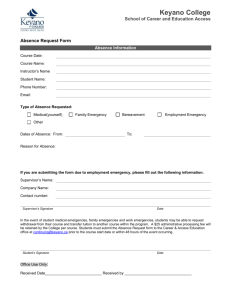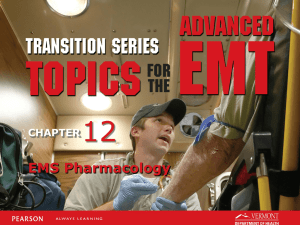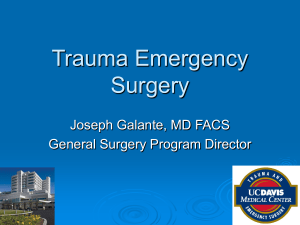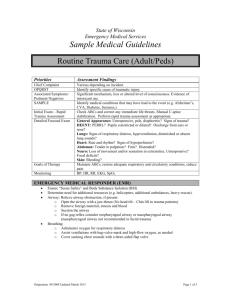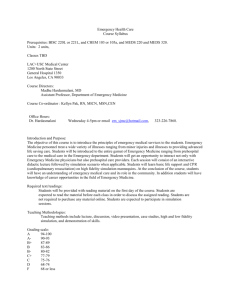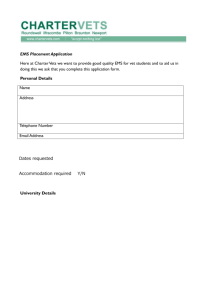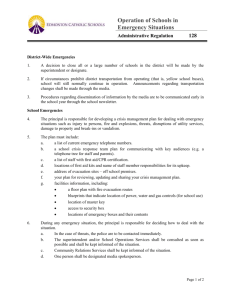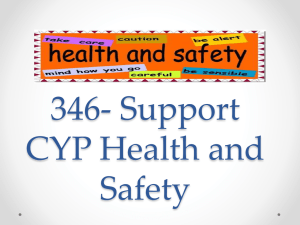EMS 112 - Great Basin College
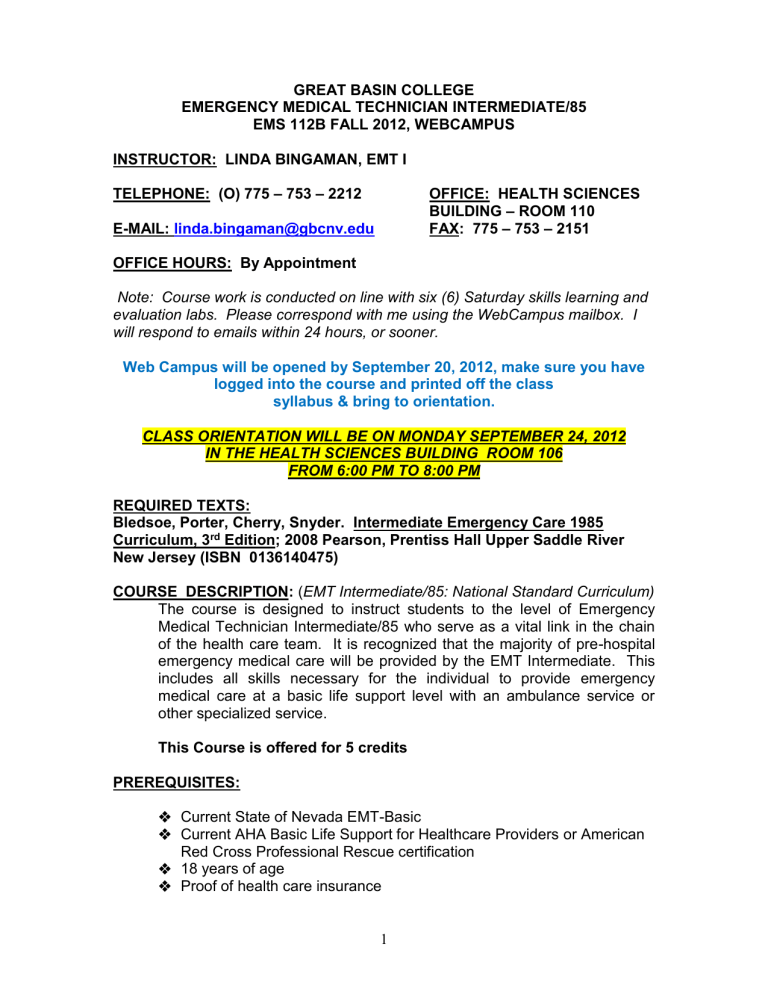
GREAT BASIN COLLEGE
EMERGENCY MEDICAL TECHNICIAN INTERMEDIATE/85
EMS 112B FALL 2012, WEBCAMPUS
INSTRUCTOR: LINDA BINGAMAN, EMT I
TELEPHONE: (O) 775 – 753 – 2212
E-MAIL: linda.bingaman@gbcnv.edu
OFFICE: HEALTH SCIENCES
BUILDING
FAX: 775
– ROOM 110
– 753 – 2151
OFFICE HOURS: By Appointment
Note: Course work is conducted on line with six (6) Saturday skills learning and evaluation labs. Please correspond with me using the WebCampus mailbox. I will respond to emails within 24 hours, or sooner.
Web Campus will be opened by September 20, 2012, make sure you have logged into the course and printed off the class
syllabus & bring to orientation.
CLASS ORIENTATION WILL BE ON MONDAY SEPTEMBER 24, 2012
IN THE HEALTH SCIENCES BUILDING ROOM 106
FROM 6:00 PM TO 8:00 PM
REQUIRED TEXTS:
Bledsoe, Porter, Cherry, Snyder. Intermediate Emergency Care 1985
Curriculum, 3 rd Edition; 2008 Pearson, Prentiss Hall Upper Saddle River
New Jersey (ISBN 0136140475)
COURSE DESCRIPTION: ( EMT Intermediate/85: National Standard Curriculum)
The course is designed to instruct students to the level of Emergency
Medical Technician Intermediate/85 who serve as a vital link in the chain of the health care team. It is recognized that the majority of pre-hospital emergency medical care will be provided by the EMT Intermediate. This includes all skills necessary for the individual to provide emergency medical care at a basic life support level with an ambulance service or other specialized service.
This Course is offered for 5 credits
PREREQUISITES:
Current State of Nevada EMT-Basic
Current AHA Basic Life Support for Healthcare Providers or American
Red Cross Professional Rescue certification
18 years of age
Proof of health care insurance
1
IMMUNIZATIONS:
REQUIRED FOR REGISTRATION:
Emergency Department and Ambulance Clinical Rotation Requirements include:
1. Negative T.B. skin test or chest x-ray within the last 12 months;
2. * Current MMR (measles, mumps, rubella), or MMR Booster or appropriate titer levels;
3. Hepatitis B series (2 required by first day of class (9/7/2010)
4. If you were born before 1957 , you are exempt from the MMR requirement.
5. Tetanus immunization last 10 years
COURSE OBJECTIVES: ( EMT-Intermediate/85 National Standard Curriculum)
After completion of the program, EMT I students will:
LEARNER OBJECTIVES LEARNER OUTCOME
MEASUREMENTS
Recognize the nature and seriousness of the patient’s condition or extent of injuries to assess requirements for emergency medical care;
Administer appropriate emergency medical care based on assessment findings of the patient’s condition;
Case Study Assessments
Chapter quizzes, Multiple
Choice Assessments
Case Study Assessments
Chapter quizzes, Multiple
Choice Assessments, Skills
Lab Evaluations
Case Study Assessments
Chapter quizzes, Multiple
Choice Assessments
Differentiate between situations in which the
EMT-I should attempt to stabilize the patient on scene and situations that require rapid and immediate transportation of the patient to the hospital;
Describe the integration of pre-hospital care into the continuum of total patient care with the emergency phase of hospital care;
Provide basic and advanced care to persons experiencing medical and traumatic emergencies;
Case Study Assessments
Chapter quizzes, Multiple
Choice Assessments
Case Study Assessments
Chapter quizzes, Multiple
Choice Assessments
Lab Skills Evaluation Demonstrate proficiency additional patient assessment skills; advanced airway procedures; intravenous therapy, and administering certain medications as per protocols;
Perform a careful patient assessment, recognize the nature and seriousness of illnesses or injuries, and determine the requirements for emergency medical care;
Lab Skills Evaluation
2
Ensure personal safety and the safety of fellow personnel;
Case Study Assessments
Chapter quizzes, Multiple
Choice Assessments
Ambulance Rotation Drive the emergency vehicle in a safe, timely, and lawful manner;
Use protective equipment in hazardous or dangerous situations, including employing body substance isolation precautions;
Initially control the scene, ensure safety, and regulate access to potentially harmful situations;
Determine the needs of the incident and communicate that information to the dispatch center; includes requesting the response of and coordinating with support agencies as needed;
Lift, move, position and other wise handle the patient to minimize discomfort and prevent further injury;
Perform safely and effectively the expectations of the job description.
Lab Skills Evaluation
Lab Skills Evaluation
Lab Skills Evaluation
Lab Skills Evaluation
Lab Skills Evaluation
TOPICAL OUTLINE: ( EMT-Intermediate/85: National Standard Curriculum)
Overview of the human body
Medical-Legal Issues of EMS
Assessing Emergency Scenes and pre-hospital patients
EMT-Enhanced Pharmacology
Respiratory and Cardiac Emergencies
Drug and Alcohol-related crisis
Environmental and Behavioral Emergencies
Trauma Emergencies
Emergency Childbirth and Pediatric Emergencies
Functioning in the Pre-hospital Care Environment
STRUCTURE OF THE COURSE:
The course is comprised of forty-seven (47) hours of on-line activities and assessments from the textbook; forty-eight (48) hours of on campus lab skills learning and evaluation; ten (10) hours of clinical; and daily online testing. The class will also meet every Monday night from 6 pm – 8 pm to
3
re view the previous week’s assignments and preview the upcoming week’s assignments.
The course has been divided into nine (9) weeks of textbook reading assignments, on-line activities and evaluations.
Six (6) Saturday learning and evaluation skills labs.
Daily online testing is required using EMT-National-Training Program.
This testing is separate from the online case studies.
Students complete reading assignments at home as well as participate on online multiple choice practice tests, case study assessments, chapter tests and other on-line learning enhancement activities that focus on key topics and concepts of becoming an EMT Intermediate. Students will complete several chapters in this way and then come together for skills learning and evaluation labs. The lab session focus on the psychomotor skills aspect of the EMT Intermediate.
The EMT Intermediate/85 course is divided into four divisions: Division I:
Preparatory, Division II: Medical Emergencies, Division III: Trauma
Emergencies, and Division IV: Special Considerations.
Each division contains the chapters for that section.
Each chapter contains: o Objectives, Multiple choice practice tests, learning activities,
Web Links & assignments, Case Studies, Videos and
Animations, and the pertinent skills sheets for the chapter.
METHODS OF INSTRUCTION:
This course uses an online (WebCampus) format consisting of weekly required reading assignments, assessment exercises, and Web activities. Web links available directly through the course offer virtually unlimited resources that relate to the topics being studied; and learning resources available through Great Basin
College’s library services,
Students are required to finish the assigned chapters for each week. At frequent intervals, students will receive instructor feedback regarding their work and overall course progress.
WEEKLY COURSE COMPONENTS:
Each Chapter consists of the following:
Chapter Objectives
Multiple Choice Self- assessment practice tests
Anatomy Labeling
WebLinks for further information
Case Study Assessments. These are submitted to the instructor for comments and grading. Please note that after submission the correct responses appear for your review.
Videos and Animations
Assignments
4
ASSESSMENT AND COMPETENCIES:
Chapter case study assessments and chapter tests are included in each chapter.
Students must have a 76% cumulative average to successfully pass the course.
In addition to passing the didactic portion of this course, the student must also pass the skills portion based on the criteria listed in the Skills Summary Sheets.
This section will be graded on a PASS/WITHDRAWAL basis.
ATTENDANCE AND PARTICIPATION:
Completion of all on-line course work, laboratory skill practice and evaluation.
AMBULANCE FIELD ROTATION OR CLINICAL TIME AT NNRH: (10 hours)
Wear a white shirt (button down or polo- type
– No emblems). Hear, neat, clean and pulled away from face; beards, trimmed, clean and neat. Fingernails clean and of a moderate length. Good personal hygiene with absence of mouth and body odor at all times. No long or dangling earrings allowed, and no facial jewelry permitted. Clothing must be clean and neat, dark pants (black or navy)
No blue jeans or pants with rivets and/or studs; no sweat pants or shorts. NO
TEE SHIRTS and black shoes or boots may be worn - must be of solid construction.
ACADEMIC INTEGRITY:
Great Basin College considers academic integrity one of it highest values. A student how obtains academic credit for work that is not the product of his or her own effort is being dishonest and undermine the academic integrity of the college. Violations of academic integrity include, but are not limited to, one or more of the following acts:
Cheating (giving or receiving information related to examination questions)
Plagiarism
WebCampus Examinations:
Students are not allowed to print or copy any test or any part of a test. This is considered a form of cheating and appropriate action will be taken.
Such behaviors are also in violation of Great Basin College Student
Conduct Code and may result in dismissal from the course.
EDUCATION AND CERTIFICATION:
The education component is designed to facilitate the acquisition of cognitive knowledge and psychomotor skills necessary to obtain a certification to practice as an EMT-Intermediate. Although the educational component is closely associated with the entities that certify and license EMS providers, the two processes are separate and distinct. Successful completion of the education component does not ensure certification or licensure.
CIVILITY STATEMENT FOR THE CLASSROOM AND WEBCAMPUS:
For the learning experience, mutual respect is required by the student and the instructor. Neither the student or the instructor, should be subject to behavior
5
that is rude, disruptive, intimidating, or demeaning. The instructor has the primary responsibility for and control over on-line and lab skills behavior & the maintenance of academic integrity.
METHOD OF EVALUATION:
26 Case Study Assessments
5 Exams
Medical Terminology Course
Practical Skills Competencies
TOTAL Points Possible
POINTS POSSIBLE
= 260 points
= 240 points
= 100 points
= Pass/Fail
= 600 points
GRADING SCALE:
Course grade will be based on a percentage of total possible points according to the following scale:
100 - 94 = A 79 - 77 = C+
93 - 90 = A
89 - 87 = B+
76 = C
75 - 70 = C-
86 - 84 = B
83 - 80 = B-
69 - 67 = D+
66 - 64 = D
63 - 60 = D-
Below 59 = F
STUDENTS MUST HAVE AT LEAST A 76% CUMULATIVE AVERAGE &
COMPLETE ALL COURSE WORK TO BE ELIGIBLE TO TAKE THE
NATIONAL REGISTRY EXAMINATION.
MEDICAL DIRECTOR:
Our course medical director is Felix DeGuzman M.D. Dr. DeGuzman approves the curriculum and acts as the ultimate medical authority regarding course content, procedures, protocols, and acts a liaison with the medical community.
Dr. DeGuzman or his designee is responsible to verify student competencies in the cognitive, affective and psychomotor domains.
ACCOMODATIONS FOR DISABILITIES:
GBC supports providing equal access for students with disabilities. An advisor is available to discuss appropriate accommodations with students. Please contact the ADA Officer (Julie Byrnes) in Elko at 775.753.2271 at your earliest convenience to request timely and appropriate accommodation.
6
WEEKLY SCHEDULE:
Please note: Each week is divided into chapters. The date and time the chapter activities open and close are listed on the schedule. You must complete the chapter activities, Case Study assessment within the time frame or the chapters close and you will receive a zero for the chapter.
EMT INTERMEDIATE/85
EMS 112B IO1, FALL SEMESTER 2012
CLASS ORIENTATION WILL BE SEPTEMBER 24, 2012 IN THE
HEALTH SCIENCES BUILDING ROOM 106 6:00 P.M. -8:00 P.M.
WEB CAMPUS WILL BE OPENED BY SEPTEMBER 20, 2012.
MAKE SURE YOU HAVE LOGGED INTO WEB CAMPUS AND PRINTED OFF
THE CLASS SYLLABUS BY THE ORIENTATION ON SEPTEMBER 24.
WEEK 1: 4.0 HR
CHAPTER 1:
DIVISION I: PREPARATORY
ROLES AND RESONSIBILITIES OF THE EMT-
INTERMEDIATE
CHAPTER 2:
CHAPTER 3:
CHAPTER 4:
EMERGENCY MEDICAL SERVICES SYSTEMS
MEDICAL-LEGAL CONSIDERATIONS OF EMERGENCY
CARE
MEDICAL TERMINOLOGY
ONLINE TESTING: 10 QUESTIONS OF AIRWAY, CARDIOLOGY, MEDICAL,
TRAUMA, OB/PEDS/SPECIAL OPS, & EMS OPS PER DAY
Begins September 24, 2012 6:00 a.m. and ends September 30, 2012 at 11:30 p.m.
WEEK 2: 5.0 HR
CHAPTER 5:
CHAPTER 6:
DOCUMENTATION
EMS COMMUNICATIONS
CHAPTER 7: HUMAN BODY SYSTEMS
ONLINE TESTING: 10 QUESTIONS OF AIRWAY, CARDIOLOGY, MEDICAL,
TRAUMA, OB/PEDS/SPECIAL OPS, & EMS OPS PER DAY
Begins October 01, 2012 6:00 a.m. and ends October 7, 2012 11:30 p.m.
WEEK 3: 6.0 HR
CHAPTER 8:
CHAPTER 9:
GENERAL PATIENT ASSESSMENT AND INITIAL
MANAGEMENT
ADVANCED AIRWAY MANAGEMENT, OXYGENATION,
AND VENTILATION
7
ONLINE TESTING: 10 QUESTIONS OF AIRWAY, CARDIOLOGY, MEDICAL,
TRAUMA, OB/PEDS/SPECIAL OPS, & EMS OPS PER DAY
Begins1 October 8, 2012 at 6:00 a.m. and ends October 14, 2012 at 11:30 p.m.
SKILLS LAB: SATURDAY OCTOBER 13, 2012 HEALTH SCIENCES
BUILDING
8.0 HR
Airway Management Lecture:
Airway Skills Lab:
8:00 a.m. – Noon
1:00 p.m. – 5:00 p.m.
WEEK 4: 7.0 HR
CHAPTER 10:
CHAPTER 11:
FLUIDS AND SHOCK
INTRAVENOUS ACCESS AND MEDICATION
CHAPTER 12:
ADMINISTRATION
PHARMACOLOGY
ONLINE TESTING: 10 QUESTIONS OF AIRWAY, CARDIOLOGY, MEDICAL,
TRAUMA, OB/PEDS/SPECIAL OPS, & EMS OPS PER DAY
Begins October 15, 2012 at 6:00 a.m. and ends October 21, 2012 at 11:30 p.m.
SKILLS LAB: SATURDAY OCTOBER 20, 2012 HEALTH SCIENCES
BUILDING
8.00 HR
Venous Access and Medication Administration Lecture: 8:00 a.m. –Noon
IV & Med Administration Skills Lab: 1:00 p.m. – 5:00 p.m.
WEEK 5: 7.0 HR DIVISION 2: MEDICAL EMERGENCIES
CHAPTER 13:
CHAPTER 14:
CHAPTER 15:
CHAPTER 16:
CARDIAC EMERGENCIES
RESPIRATORY EMERGENCIES
GASTROINTESTINAL EMERGENCIES
(2.0)
(2.0)
(1.0)
TOXICOLOGIC AND OVERDOSE
EMERGENCIES (1.0)
ALLERGIC REACTION AND ANAPHYLAXIS (1.0) CHAPTER 17:
ONLINE TESTING: 10 QUESTIONS OF AIRWAY, CARDIOLOGY, MEDICAL,
TRAUMA, OB/PEDS/SPECIAL OPS, & EMS OPS PER DAY
Begins October 22, 2012 6:00 a.m. and ends October 28, 2012 at 11:30 p.m.
8
WEEK 6: 5.0 HR
CHAPTER 18:
CHAPTER 19:
NEUROLOGIC EMERGENCIES
DIABETIC EMERGENCIES
(1.0)
(1.0)
CHAPTER 20:
CHAPTER 21:
CHAPTER 22:
ENVIRONMENTAL EMERGENCIES
BEHAVIORAL EMERGENCIES
GYNECOLOGICAL EMERGENCIES
(1.0)
(1.0)
(1.0)
ONLINE TESTING: 10 QUESTIONS OF AIRWAY, CARDIOLOGY, MEDICAL,
TRAUMA, OB/PEDS/SPECIAL OPS, & EMS OPS PER DAY
Begins October 29, 2012 at 6:00 a.m. and ends November 04, 2012 at 11:30 p.m.
SKILLS LAB: NOVEMBER 03, 2012 HEALTH SCIENCES BUILDING
8.0 HR
Airway Management Skills Lab: 8:00 a.m. – Noon.
IV & Med. Administration Skills Lab – 1:00 p.m. – 5.00 p.m.
WEEK 7: 5.0 HR
CHAPTER 23:
DIVISION 3: TRAUMA EMERGENCIES
TRAUMA EMERGENCIES
ONLINE TESTING: 10 QUESTIONS OF AIRWAY, CARDIOLOGY, MEDICAL,
TRAUMA, OB/PEDS/SPECIAL OPS, & EMS OPS PER DAY
Begins November 05, 2012 at 6:00 a.n. and ends November 11, 2012 at 11:30 p.m.
SKILLS LAB: SATURDAY, NOVEMBER 10, 2012
HEALTH SCIENCES BUILDING
8.0 HR
Trauma Patient Assessment Skills Lab: 8:00 a.m. – Noon
Airway and IV/Med Admin. Review 1:00 p.m. – 5:00 p.m.
WEEK 8: 6.O HR
CHAPTER 24:
CHAPTER 25:
DIVISION 4: SPECIAL CONSIDERATIONS
OBSTETRICAL EMERGENCIES
NEONATAL RESUSCITATION
(1.0)
(1.0)
CHAPTER 26: PEDIATRIC EMERGENCIES (4.0)
ONLINE TESTING: 10 QUESTIONS OF AIRWAY, CARDIOLOGY, MEDICAL,
TRAUMA, OB/PEDS/SPECIAL OPS, & EMS OPS PER DAY
Begins November 12, 2012 at 6:00 a.m. and ends November 18, 2012 at 11:30 p.m.
9
SKILLS LAB: SATURDAY, NOVEMBER 17, 2012
HEALTH SCIENCES BUILDING
8.00 HR
PEPP Class Review: 8:00 a.m. – 5:00 p.m.
WEEK 9: 2.0 HR
CHAPTER 27:
CHAPTER 28:
GERIATRIC EMERGENCIES
EMS RESPONSE TO WEAPONS
OF MASS DESTRUCTION
(1.0)
(1.0)
ONLINE TESTING: 10 QUESTIONS OF AIRWAY, CARDIOLOGY, MEDICAL,
TRAUMA, OB/PEDS/SPECIAL OPS, & EMS OPS PER DAY
Begins November 19, 2012 at 6:00 a.m. and ends November 25, 2012 at 11:30 p.m.
SKILLS LAB: SATURDAY, DECEMBER 1, 2012
HEALTH SCIENCES BUILDING
8.00 HR
ALL SKILLS REVIEW (Airway Management, IV/Med
Administration, Patient Assessment, IO) 8:00 a.m. – 5:00 p.m.
MONDAY CLASSES: 6:00 p.m. to 8:00 p.m.
October 1, 8, 15, 22, 29
November 5, 12, 19
December 3
SATURDAY, DECEMBER 8, 2012: NREMT SKILLS TESTING AND NREMT
EXAM Starting at 8:00 a.m.
10
MEMORANDUM OF UNDERSTANDING
THIS DOCUMENT MUST BE TURNED IN AT THE END OF THE
CLASS PERIOD on OCTOBER 1, 2012
I, __________________________________, acknowledge receipt of a
(Print Name) course syllabus and course outline. I understand I have enrolled in a class that requires higher grading standards and attendance requirements than other Great Basin College courses. I will do my best to maintain the higher standards in accordance with the D.O.T.
National Standard Curriculum for the EMT –Intermediate/85. I have had an opportunity to ask questions and clarify the course requirements. I agree to follow these standards and expectations which include ethical and behavioral standards. I understand that course work is done on-line according to a schedule that I will follow. I understand I must attend the Friday skills learning/evaluation labs.
Signed: _____________________________________ Date: ___________
Address: ____________________________________________________
Telephone Number: ____________________E-Mail: ________________
Revised: 9/4/12
11
